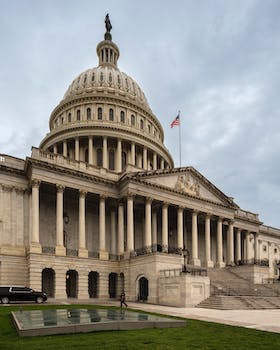-
Table of Contents
“The Power to Uphold Equality: Congress’ Authority in Enforcing the Reconstruction Amendments”
Introduction
The Reconstruction Amendments, consisting of the 13th, 14th, and 15th Amendments to the United States Constitution, were enacted during the Reconstruction Era following the American Civil War. These amendments aimed to address the issues of slavery, citizenship, equal protection, and voting rights for African Americans. Congress, as the legislative branch of the federal government, holds the authority to enforce these amendments and ensure their implementation across the nation.
The Role of Congress in Enforcing the Reconstruction Amendments
The Reconstruction Amendments, consisting of the 13th, 14th, and 15th Amendments to the United States Constitution, were enacted in the aftermath of the Civil War to address the issues of slavery, citizenship, and voting rights. These amendments were intended to ensure the equal protection of the law and the rights of all citizens, regardless of race or color. While the amendments themselves provided a framework for equality, it was up to Congress to enforce and protect these rights.
Congress played a crucial role in enforcing the Reconstruction Amendments through legislation and oversight. The 13th Amendment, ratified in 1865, abolished slavery and involuntary servitude, except as punishment for a crime. To enforce this amendment, Congress passed the Civil Rights Act of 1866, which granted citizenship and equal rights to all persons born in the United States, regardless of race or color. This act also authorized federal courts to hear cases involving violations of civil rights, providing a means for individuals to seek redress for their grievances.
The 14th Amendment, ratified in 1868, further expanded the rights of citizens and provided equal protection under the law. It granted citizenship to all persons born or naturalized in the United States and prohibited states from denying any person the equal protection of the laws. Congress used its authority under this amendment to pass the Civil Rights Act of 1871, also known as the Ku Klux Klan Act, which aimed to combat the violence and intimidation tactics used by white supremacist groups to suppress the rights of African Americans. This act empowered the federal government to prosecute individuals who violated the civil rights of others and provided for the suspension of habeas corpus in certain cases.
The 15th Amendment, ratified in 1870, prohibited states from denying the right to vote based on race, color, or previous condition of servitude. Congress passed the Enforcement Acts of 1870 and 1871 to protect the voting rights of African Americans and combat voter intimidation and suppression. These acts authorized federal supervision of elections in states with a history of discrimination and provided for criminal penalties for those who interfered with the right to vote.
In addition to legislation, Congress exercised its oversight authority to ensure the enforcement of the Reconstruction Amendments. It established committees to investigate and report on civil rights violations, such as the Joint Committee on Reconstruction, which played a key role in documenting the atrocities committed against African Americans in the South. Congress also held hearings and passed resolutions condemning acts of violence and discrimination, putting pressure on the executive branch to take action.
However, despite Congress’s efforts, the enforcement of the Reconstruction Amendments faced significant challenges. The Supreme Court, in a series of decisions known as the “Slaughter-House Cases” and “United States v. Cruikshank,” limited the scope of the amendments and weakened their effectiveness. These decisions held that the amendments only protected individuals from state action, not from private acts of discrimination or violence. This interpretation undermined Congress’s ability to fully enforce the amendments and protect the rights of African Americans.
In conclusion, Congress played a vital role in enforcing the Reconstruction Amendments through legislation and oversight. It passed laws to protect civil rights, combat violence and discrimination, and ensure equal protection under the law. However, the Supreme Court’s narrow interpretation of the amendments limited their effectiveness and hindered Congress’s efforts. Despite these challenges, Congress’s actions laid the foundation for future civil rights legislation and set a precedent for the protection of individual rights. The authority of Congress in enforcing the Reconstruction Amendments remains a significant aspect of American history and a reminder of the ongoing struggle for equality and justice.
Congressional Powers and the Reconstruction Amendments

The Reconstruction Amendments, consisting of the Thirteenth, Fourteenth, and Fifteenth Amendments to the United States Constitution, were enacted in the aftermath of the Civil War to address the issues of slavery, citizenship, and voting rights. These amendments granted Congress the authority to enforce their provisions through appropriate legislation. This article will explore the authority of Congress in enforcing the Reconstruction Amendments and the significance of this power.
The Thirteenth Amendment, ratified in 1865, abolished slavery and involuntary servitude, except as punishment for a crime. To ensure its enforcement, Congress was given the power to pass laws that would eradicate the vestiges of slavery and protect the newly freed slaves from discrimination. This authority allowed Congress to enact legislation such as the Civil Rights Act of 1866 and the Civil Rights Act of 1875, which aimed to secure equal rights for all citizens, regardless of race or color.
The Fourteenth Amendment, ratified in 1868, granted citizenship to all persons born or naturalized in the United States and prohibited states from denying any person equal protection of the laws. Congress was empowered to enforce this amendment through appropriate legislation. In exercising this authority, Congress passed the Civil Rights Act of 1871, also known as the Ku Klux Klan Act, which aimed to combat the violence and intimidation tactics employed by white supremacist groups against African Americans.
The Fifteenth Amendment, ratified in 1870, prohibited the denial of the right to vote based on race, color, or previous condition of servitude. Congress was given the power to enforce this amendment through appropriate legislation. In response, Congress passed the Enforcement Acts of 1870 and 1871, which aimed to protect the voting rights of African Americans by combating voter intimidation and ensuring fair elections.
The authority of Congress in enforcing the Reconstruction Amendments was significant in several ways. Firstly, it allowed Congress to address the systemic discrimination and oppression faced by African Americans in the post-Civil War era. By passing legislation to enforce the amendments, Congress sought to ensure that the promises of freedom, equality, and citizenship were not mere words on paper, but tangible rights that could be enjoyed by all.
Secondly, the authority of Congress in enforcing the Reconstruction Amendments helped to shape the interpretation and application of these amendments by the courts. Through its legislation, Congress provided a framework for the judiciary to interpret the amendments in a manner that would protect the rights of African Americans. This was particularly evident in the landmark Supreme Court case of Brown v. Board of Education in 1954, where the Court relied on the Fourteenth Amendment and congressional intent to strike down racial segregation in public schools.
Lastly, the authority of Congress in enforcing the Reconstruction Amendments demonstrated the power of the federal government to intervene in matters of civil rights and social justice. By enacting legislation to enforce the amendments, Congress asserted its role as a protector of individual rights and a promoter of equality. This authority continues to be relevant today, as Congress plays a crucial role in enacting legislation to combat discrimination and ensure equal protection under the law.
In conclusion, the authority of Congress in enforcing the Reconstruction Amendments was a vital tool in the fight against discrimination and the protection of civil rights. Through its legislation, Congress sought to eradicate the vestiges of slavery, secure equal rights for all citizens, and protect the voting rights of African Americans. This authority not only shaped the interpretation and application of the amendments but also demonstrated the power of the federal government to intervene in matters of civil rights. The legacy of this authority continues to be felt today, as Congress remains a key player in the ongoing struggle for equality and justice.
Challenges to Congressional Authority in Enforcing the Reconstruction Amendments
The Reconstruction Amendments, consisting of the 13th, 14th, and 15th Amendments to the United States Constitution, were enacted in the aftermath of the Civil War to secure the rights and freedoms of newly freed slaves. These amendments granted Congress the authority to enforce their provisions through appropriate legislation. However, challenges to congressional authority in enforcing the Reconstruction Amendments have emerged over the years, raising important questions about the scope and limits of Congress’s power.
One of the primary challenges to congressional authority in enforcing the Reconstruction Amendments is the argument that such enforcement infringes upon states’ rights. Critics contend that Congress’s power to enforce these amendments encroaches upon the traditional powers reserved to the states under the Tenth Amendment. They argue that the Reconstruction Amendments were intended to address the actions of individual states, not to grant Congress broad authority to regulate state conduct. This challenge to congressional authority raises fundamental questions about the balance of power between the federal government and the states.
Another challenge to congressional authority in enforcing the Reconstruction Amendments is the argument that such enforcement violates the principles of federalism. Federalism, the division of powers between the federal government and the states, is a cornerstone of the American constitutional system. Critics argue that Congress’s authority to enforce the Reconstruction Amendments undermines this division of powers by allowing the federal government to intrude into areas traditionally reserved to the states. They contend that issues such as voting rights and equal protection should be left to the states to address, rather than being subject to federal regulation. This challenge to congressional authority raises important questions about the proper role of the federal government in protecting individual rights.
Furthermore, challenges to congressional authority in enforcing the Reconstruction Amendments have also arisen based on concerns about the separation of powers. The separation of powers, a fundamental principle of the American constitutional system, divides the powers of government among three branches: the legislative, executive, and judicial. Critics argue that Congress’s authority to enforce the Reconstruction Amendments infringes upon the powers of the executive and judicial branches. They contend that Congress, through its enforcement powers, is effectively legislating and adjudicating, roles traditionally reserved to the other branches. This challenge to congressional authority raises significant questions about the proper balance of power among the branches of government.
Despite these challenges, the Supreme Court has generally upheld Congress’s authority in enforcing the Reconstruction Amendments. The Court has recognized that the Reconstruction Amendments grant Congress broad power to enforce their provisions and that this power is necessary to ensure the full realization of the amendments’ goals. The Court has also emphasized that Congress’s authority in this area is not unlimited and must be exercised in a manner consistent with the Constitution’s overall structure and principles. This recognition by the Court strikes a delicate balance between protecting individual rights and preserving the principles of federalism and separation of powers.
In conclusion, challenges to congressional authority in enforcing the Reconstruction Amendments have raised important questions about the scope and limits of Congress’s power. Critics argue that such enforcement infringes upon states’ rights, violates principles of federalism, and undermines the separation of powers. However, the Supreme Court has generally upheld Congress’s authority in this area, recognizing the necessity of such enforcement to secure the rights and freedoms of all Americans. The ongoing debate over the authority of Congress in enforcing the Reconstruction Amendments highlights the ongoing tension between protecting individual rights and preserving the principles of federalism and separation of powers in the American constitutional system.
Q&A
1. What is the authority of Congress in enforcing the Reconstruction Amendments?
Congress has the authority to pass legislation and take actions to enforce the provisions of the Reconstruction Amendments.
2. How does Congress enforce the Reconstruction Amendments?
Congress can pass laws, such as the Civil Rights Act of 1964 and the Voting Rights Act of 1965, to protect and enforce the rights guaranteed by the Reconstruction Amendments.
3. Can Congress enforce the Reconstruction Amendments through other means?
Yes, Congress can also use its oversight and investigatory powers to ensure compliance with the Reconstruction Amendments, as well as provide funding and support for programs aimed at promoting equality and ending discrimination.
Conclusion
In conclusion, the authority of Congress in enforcing the Reconstruction Amendments is significant. Through legislation, oversight, and the power to enforce civil rights, Congress plays a crucial role in upholding the principles of equality and protection of individual rights as outlined in the Reconstruction Amendments. This authority allows Congress to address issues of discrimination, ensure equal access to opportunities, and promote social justice in the United States.

